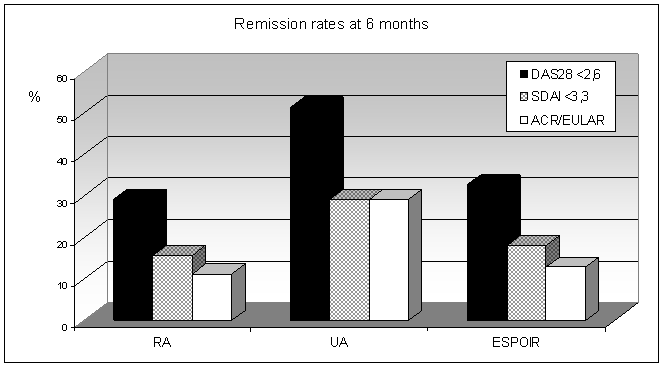Session Information
Session Type: Abstract Submissions (ACR)
Background/Purpose: Clinical remission is the best achievable state in patients with rheumatoid arthritis (RA). The definition of remission, however, is still under debate. The aim of this study was to assess the prevalence of remission during the initial follow-up of a cohort of patients with early inflammatory arthritis, to evaluate the concordance across different criteria sets in defining this state, and to look for predictive factors for early- and sustained remission.
Methods: Patients from the French ESPOIR cohort, who had arthritis involving at least 2 joints for between 6 weeks and 6 months, and had not received any specific therapy before their inclusion, were followed-up every 6 months.Treatment was collected, but no specific strategy was imposed. We analyzed early remission (at 6 months follow-up) and sustained remission (remission state in both 6 months- and 1 year visits) in 3 different groups of patients: Patients who were diagnosed as having RA according to 2010 ACR/EULAR criteria (RA), undifferentiated arthritis (UA) after 1 year of follow-up, and the entire cohort (ESPOIR). Remission was defined according to 2011 ACR/EULAR criteria, 28 Joint Disease Activity Score (DAS28<2.6), and Simplified Disease Activity Index (SDAI<3.3). Agreement across available criteria sets was evaluated by k-coefficient. Predictive factors for sustained remission at 1 year in RA patients were analyzed by logistic regression, with potential predictive factors tested from available clinical, biological and demographic data.
Results: 813 patients were included, mean age (SD) 48.1(12.6) years, 45.8% positive for rheumatoid factor (RF), 38.8% for anti-CCP test. Early remission rates in the RA/UA/ESPOIR groups were observed in respectively 29.2% (181/682), 51.4% (55/123) and 32.7% (239/813) of patients by DAS28; 15.7%, 29.1% and 18% by SDAI; and 11.2%, 29.1% and 12.8% by ACR/EULAR criteria. Agreement between classifications of remission by k-statistics was low for DAS28 vs ACR/EULAR (r=0.44 [0.38-0.51]), high for SDAI vs ACR/EULAR (r=0.78 [0.72-0-84]), and moderate for SDAI vs DAS28 (r=0.54 [0.48-0.61]). Lower baseline disease activity scores (DAS28<5.1), non-menopausal status and younger age (<50 years) were the best predictive factors for sustained remission at 1 year, with consistent results across the 3 definitions of remission.
Conclusion: Our study showed that the rate of early (6 months) and sustained remission at 1 year in a cohort of early inflammatory arthritis is dependent on the definition used, with a variable degree of agreement across criteria sets, but with consistent predictive factors of favourable outcome at 1 year in patients finally diagnosed with RA: Younger age, lower baseline DAS28 and non-menopausal status.
Disclosure:
C. Lukas,
None;
I. Hmamouchi,
None;
X. Le Loet,
None;
B. Fautrel,
None;
B. Combe,
None.
« Back to 2012 ACR/ARHP Annual Meeting
ACR Meeting Abstracts - https://acrabstracts.org/abstract/prevalence-concordance-and-predictors-of-early-and-sustained-remission-assessed-by-various-indices-in-the-french-early-arthritis-espoir-cohort/

